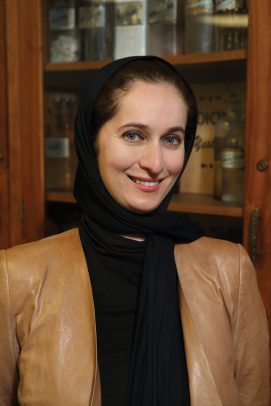Incorporating pharmacies, essential medicine in policy
For more than 10 years, Dima Qato worked as a retail pharmacist and witnessed countless examples of the vital role pharmacies play in the public health system, particularly when it comes to access to and safe use of medications.
However, while many like Qato consider pharmacies to be an essential part of our health care system, the independent and chain retailers are not regulated by or held accountable to any of the groups that provide checks and balances for other essential health services, like care in hospitals and clinics.
Through research, Qato wants to draw attention to the significant public health risks associated with unchecked retail pharmacy practices and the potential for pharmacies to help provide solutions.
“This is not a criticism of pharmacies,” said Qato, assistant professor of pharmacy systems, outcomes and policy in the UIC College of Pharmacy. “This is about advocating for accountability that reduces health disparities and prevents harm to the public.”
For example, Qato’s research has found that people living on the South and West Sides of Chicago are more likely than others in Chicago to live in a pharmacy desert, which she defines as living more than one mile away from a pharmacy or, in cases where there is no access to public or other means of transportation, a half-mile from a pharmacy.
“For many people, medication is essential to maintain health — both physical and mental — and the ability to go about daily life,” Qato said. “But in many communities, people simply cannot get the medication they need, not only because of money, which is, and has always been, the focus of most policy efforts to make prescription drugs affordable, but because their local pharmacy has closed or there is no local pharmacy.”
Qato said that despite the growing number of pharmacy deserts in Chicago, the number of pharmacies has not changed in recent years.
“There are plenty of pharmacies in Chicago, they are just not equitably distributed,” Qato said, noting that pharmacy deserts exist primarily in poor, minority communities.
“The government targets and funds the development of federally qualified health centers in medically underserved areas, but there are no rules or incentives in place to ensure that all communities have access to pharmacies,” Qato said. “Pharmacies open and close largely based on business profitability, not local needs and, until there is public accountability, such business decisions should not be surprising.”
Pharmacies also play a significant role in helping patients to manage their medication and use it safely – or at least they should, Qato said.
“I also study national population-based medication data,” she said, “to identify common medication combinations, or medication-supplement combinations, that might put patients at risk of experiencing an adverse event due to the interaction of drugs.”
Findings from Qato’s research, which has received significant national news media and hospital emergency room attention, provides evidence that older adults are not only increasingly using prescription drugs, but that many are also using them in potentially deadly combinations.
Perhaps in the future, she said, pharmacies can improve dispensing practices and help mitigate the use of these dangerous combinations.
“Prescriptions often come from more than one physician,” Qato said. “Therefore, the prescribing doctor, when making a treatment decision, may not be aware of all the medications or supplements a patient is taking.
“As pharmacists, identifying adverse medication combinations is an important part of our job. The challenge is that this is not a regulated practice,” she said.
Qato hopes her research provides the evidence needed for the creation and evaluation of potential public policies at local, state or federal levels.
“My research is about ensuring people, regardless of where they live or who they are, have access to essential medicines. It’s about understanding and improving the safe use of medications. It’s also about making sure pharmacies are not ignored in the development and implementation of policies aimed at improving public health and reducing health disparities,” Qato said.
Qato received a bachelor’s degree in biological sciences from the University of Illinois at Urbana-Champaign, a PharmD from the UIC College of Pharmacy, a master’s degree in public health from Johns Hopkins School of Public Health, and a Ph.D. from the UIC School of Public Health.

